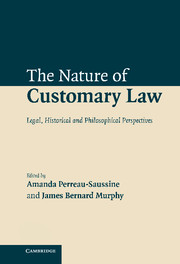Book contents
- Frontmatter
- Contents
- List of contributors
- Table of cases
- The character of customary law: an introduction
- Part I Custom and morality: natural law, customary law and ius gentium
- 1 Pitfalls in the interpretation of customary law
- 2 The moral role of conventions
- 3 Habit and convention at the foundation of custom
- 4 Custom, ordinance and natural right in Gratian's Decretum
- 5 Vitoria and Suarez on ius gentium, natural law, and custom
- 6 Custom and positivity: an examination of the philosophic ground of the Hegel–Savigny controversy
- Part 2 Custom and law: custom, common law and customary international law
- Index of names
4 - Custom, ordinance and natural right in Gratian's Decretum
Published online by Cambridge University Press: 30 June 2009
- Frontmatter
- Contents
- List of contributors
- Table of cases
- The character of customary law: an introduction
- Part I Custom and morality: natural law, customary law and ius gentium
- 1 Pitfalls in the interpretation of customary law
- 2 The moral role of conventions
- 3 Habit and convention at the foundation of custom
- 4 Custom, ordinance and natural right in Gratian's Decretum
- 5 Vitoria and Suarez on ius gentium, natural law, and custom
- 6 Custom and positivity: an examination of the philosophic ground of the Hegel–Savigny controversy
- Part 2 Custom and law: custom, common law and customary international law
- Index of names
Summary
As historians of law have long recognized, Gratian's Harmony of Discordant Canons, commonly known as the Decretum, is a foundational text for modern Western jurisprudence. Even though this text presents many interpretative difficulties, in part because it has almost certainly been altered and expanded in a variety of ways, its main purpose is clear enough. That is, as the title indicates, it represents an attempt to show how the diverse and seemingly inconsistent canons of the church can be interpreted and applied in a consistent way – in a word, harmonized. In the first twenty distinctions of the Decretum Gratian sets forth the general principles governing the interpretation of laws. (Thus, modern commentators often refer to these distinctions as the “treatise on laws,” a usage I follow.) While these distinctions do not comprise a fully worked out theory of law, they do set forth a coherent conception of law developed in what was to become the preferred scholastic way – that is to say, through the selection and interpretation of authoritative texts, here including copious citations from patristic sources and Isidore's Etymologies as well as legal texts properly so called.
The Decretum begins as follows:
The human race is ruled by a twofold rule, namely, natural right and practices. Natural right is that which is contained in the law and the Gospel, by which each person is commanded to do to others what he would wish to be done to himself, and forbidden to render to others that which he would not have done to himself. Hence, Christ says in the Gospel, “All things whatever that you would wish other people to do to you, do the same also to them. For this is the law and the prophets.”
(Decretum D.1, pr.)- Type
- Chapter
- Information
- The Nature of Customary LawLegal, Historical and Philosophical Perspectives, pp. 79 - 100Publisher: Cambridge University PressPrint publication year: 2007
- 3
- Cited by



